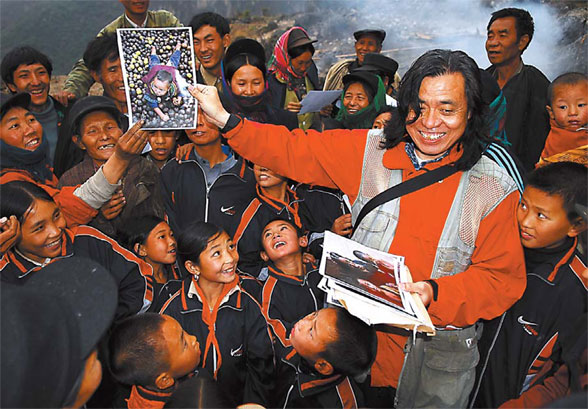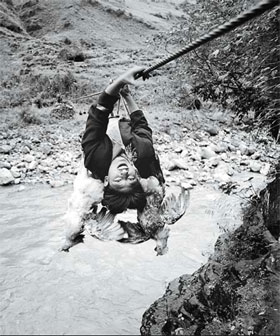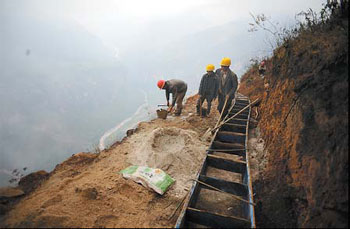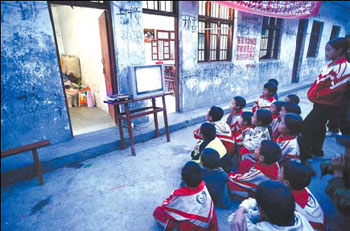A forgotten people
|
Lin Qiang shows children and villagers the photos he has taken for them. |
CHENGDU: At the end of a single access path just one meter wide with a dizzying drop on one side lies a forgotten world - a settlement for some of China's leprosy sufferers, established in 1963.
Its creators planned its isolation so well that even after more than four decades, the original inhabitants of Abuluoha village and their children have never ventured back into the outside world despite being free of the disease for many years.
But for Lin Qiang, a 53-year-old education official in Sichuan province, they might have remained forgotten and unnoticed for decades more.
People nearby know of Abuluoha, but few dare to go there because the inhabitants are either leprosy patients or the children of leprosy patients.
|
A photo taken by Lin Qiang in 2005 shows an Abuluoha villager sliding on a rope to cross the river with two chickens on his back. |
The disease is infectious and chronic, characterized by ulcers of the skin, bone, and internal organs, leading to a loss of sensation, paralysis, gangrene and deformation.
The local Yi ethnic minority, horrified by the severe pain and suffering caused by leprosy, used to drive out the victims, forcing them to live in remote mountains. In some cases, they burned or buried them alive or drowned them.
In 1963, the local government built a medical camp in a valley in Butuo county of Liangshan Yi autonomous prefecture, where they gathered all the leprosy sufferers from nearby villages.
That was Abuluoha, and the villagers became prisoners of the outside world's fear despite the fact they had all been cured. They eked out a subsistence living from the land around the settlement.
When Lin first visited the village in 2005, Abuluoha had no communication with the outside world.
Lin, an education division director in charge of sports, healthcare and art, first heard of the "leprosy village" during a work trip to Butuo county in 2003.
He became curious, but the locals turned down repeated requests to guide him there.
A year later, Lin returned, but still no one dared to lead him.
His persistence was rewarded in 2005 when one man finally agreed.
Entering the undisturbed life of Abuluoha, Lin was astounded by scenes he had never imagined - disease-damaged limbs, unimaginably poverty, primeval conditions, and innocent, curious children.
Lin spent four days visiting all 63 families - 184 people. They lived off 33 hectares of poor land and all the produce was equally distributed.
He was dismayed by the illiteracy. Most of the children were in good physical shape, but none could read and write.
|
A new road is built to link Abuluoha with the outside world. Photos courtesy of Lin Qiang |
"Now that I have found them, I am bound to help them. They need a school because nothing but knowledge can change their lives," Lin says. "With a proper education, young people can leave the village and seek their fortune in the outside world."
He persuaded the county education department to allocate 200,000 yuan ($27,400) from its tight budget to set up a school in Abuluoha.
On Sep 15, 2005, the village school opened, taking in 34 children aged from 7 to 17 and Lin was appointed honorary headmaster.
Lin brought the children stationery worth 70,000 yuan ($9,600) donated by friends and 3,000 yuan ($410) in cash.
The county government gave 200 yuan ($27) a month subsidy to each of the two teachers at the school. Lin tried his best to finance and increase it to 800 yuan. He also covered the students' lunch costs.
Having served in the army, Lin knew about perseverance and responsibility. He seized every chance to visit Abuluoha, bringing medicines, daily necessities and money to almost every family.
One old man named Acong Ercong lived alone without family. Leprosy had disabled his hands. He had no proper shelter nor even a coat to wear. Lin gave him his coat the first time he saw the old man's topless torso.
He became close to the old man during the visits. With his assistance, Acong Ercong gained a new hut made of mud, brick and stone and raised a pig. "Now I have little to worry about," says Acong Ercong, after moving into his new house.
Several months later Lin stopped by the old man's home, but could not find him. He was told that Acong Ercong had fallen off the cliff on the narrow path one night as he walked in the dark.
The news prompted Lin to have a better road built and to establish an electricity supply to the village.
This time he took 20,000 yuan of his own meager earnings, but with remorse at not spending the same time, energy and resources on his own family
"I can't abandon them," Lin told his wife.
"So long as you are happy," she replied.
|
Children from Abuluoha village watching TV, a luxurious item there. |
Lin seldom talks about his work in Abuluoha, but his story has spread among friends. Many have contributed money, books and clothes. A company gave a power generator and a friend dropped by one night with a large box of chocolates for the children there.
The mountain path has been widened and the power generator now hums at night, lighting up the village.
Lin's work has also attracted government attention to Abuluoha. Early last year, the county police sent personnel there for the first time to conduct a census and issue residency certificates.
The local government has dug two new wells and built filtration and storage facilities for irrigation and drinking water.
The prefecture government has reconsidered its policies on villages such as Abuluoha and the health authority plans to set up a healthcare service in each of the 18 "leprosy villages" in Liangshan.
The education department has promised to send every child in these villages to school and exempt them from all fees.
The civil affairs department has registered all needy families in the villages for minimum living standard allowances.
Abuluoha people have painted Lin's name and deeds on the cliff in tribute.
A year after the school opened, all the students are still attending.
Student Qieshan Qiejia wrote in a letter, "Dear Uncle Lin, thank you very much. Before I went to school, I was blind like I was in a dark night. But now I can read 700 words."
The village still has no mail service and the children wait for months to hand their letters to him in person.
However, Lin does not see himself as the "patron" of Abuluoha. "Abuluoha people purify my soul. They give me a lot," he says. "When I am with these brave, innocent and persevering people, I am empowered by love and affection."
(China Daily 02/22/2008 page18)


















